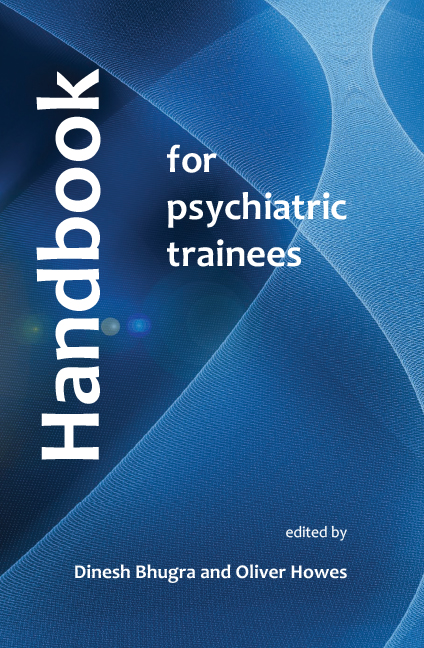Book contents
- Frontmatter
- Contents
- List of tables, boxes and figures
- List of contributors
- 1 Psychiatric training: the next steps
- Part 1
- Part 2
- Part 3
- 14 Personal safety
- 15 Managing violence
- 16 Managing difficult clinical situations
- 17 Understanding and managing stress
- 18 Managing time: the key to professional success
- 19 Negotiation skills
- 20 Presentation skills
- 21 Mental health review tribunals: reports and hearings
- 22 How to get published
- 23 Mental health informatics
- 24 Clinical governance
- 25 Lifelong learning and revalidation
- 26 Mentoring and shadowing
- 27 The MRCPsych examinations
- 28 Flexible training
- 29 UK training for overseas doctors and opportunities for UK doctors to train outside the EEC
- 30 Academic careers
- 31 Higher degrees
- Index
17 - Understanding and managing stress
from Part 3
- Frontmatter
- Contents
- List of tables, boxes and figures
- List of contributors
- 1 Psychiatric training: the next steps
- Part 1
- Part 2
- Part 3
- 14 Personal safety
- 15 Managing violence
- 16 Managing difficult clinical situations
- 17 Understanding and managing stress
- 18 Managing time: the key to professional success
- 19 Negotiation skills
- 20 Presentation skills
- 21 Mental health review tribunals: reports and hearings
- 22 How to get published
- 23 Mental health informatics
- 24 Clinical governance
- 25 Lifelong learning and revalidation
- 26 Mentoring and shadowing
- 27 The MRCPsych examinations
- 28 Flexible training
- 29 UK training for overseas doctors and opportunities for UK doctors to train outside the EEC
- 30 Academic careers
- 31 Higher degrees
- Index
Summary
Healthcare professionals have repeatedly reported high levels of stress and demonstrate an increased frequency of psychiatric caseness compared with the general population. It is clear that being a doctor can be bad for your mental health. The problem of workplace stress is taken very seriously by the Department of Health and NHS Employers (the umbrella organisation for the personnel function of NHS Trusts), partly because stress has been identified as the leading cause of absence due to sickness in the National Health Service (NHS) – up to 30% of the total. The Department of Health has elaborated policies aimed at decreasing stress and its causes in the NHS. These policies draw on broader work in this field by the Health and Safety Executive.
Among doctors, consultant psychiatrists report higher levels of stress than their general medical colleagues, despite objectively less heavy workloads (Deary et al, 1996a). Mental health professionals are confronted by many sources of stress in their jobs. Staff of all disciplines and at all grades identify as stressors: heavy workloads; increased paperwork and bureaucracy; lack of administrative support; the emotionally and physically demanding environment of the acute ward; dealing with difficult or violent patients; having a poor physical work environment; and having to take the blame when things go wrong (Sainsbury Centre for Mental Health, 2000).
In this chapter we consider the stressors that confront psychiatrists in general, the specific stressors of clinical training and the issue of how best to manage stress. We make brief mention of the issues faced by the doctor with a mental illness and say a little about the ways that the employing organisation can contribute to addressing the problem of staff stress. We start by framing the stress process within a particular model that better enables us to understand the complex set of factors that comprise the term ‘occupational stress’. It is important to state that, despite the current moral panic surrounding it, stress is not necessarily negative. An optimal level of stress keeps us motivated and alert. Highly successful people in all walks of life positively embrace stress and most of us tolerate it well most of the time. However, excessive stress, particularly if it is prolonged, can result in mental and physical health problems.
- Type
- Chapter
- Information
- Handbook for Psychiatric Trainees , pp. 157 - 168Publisher: Royal College of PsychiatristsPrint publication year: 2008



